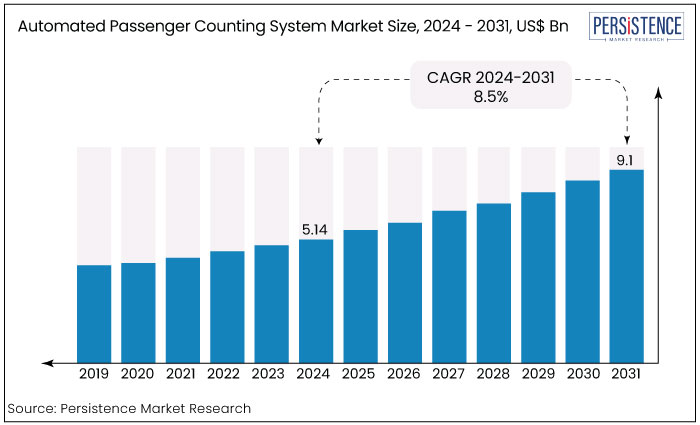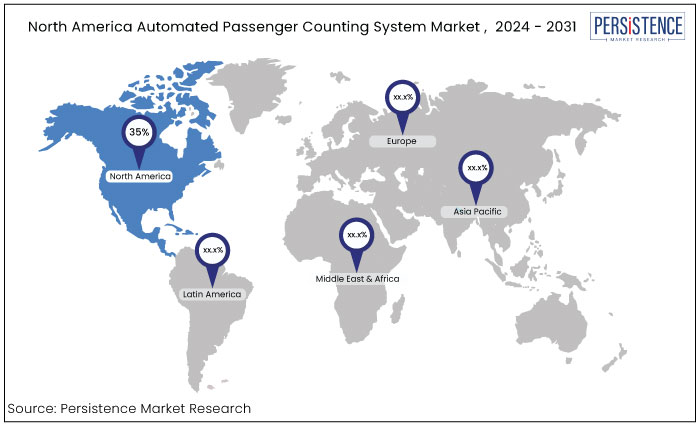Industry: Automotive & Transportation
Published Date: September-2024
Format: PPT*, PDF, EXCEL
Delivery Timelines: Contact Sales
Number of Pages: 172
Report ID: PMRREP34799
The automated passenger counting system market is estimated to increase from US$5.14 Bn in 2024 to US$9.1 Bn by 2031. The market is projected to record a CAGR of 8.5% during the forecast period from 2024 to 2031. The Integration of AI, IoT, and machine learning enhances automated passenger counting system accuracy and efficiency which leads the market to get a substantial market growth. Display systems type of the APC are estimated to gain a substantial market share over the forecast period.

Key Highlights of the Market
|
Market Attributes |
Key Insights |
|
Automated Passenger Counting System Market Size (2024E) |
US$5.14 Bn |
|
Projected Market Value (2031F) |
US$9.1 Bn |
|
Global Market Growth Rate (CAGR 2024 to 2031) |
8.5% |
|
Historical Market Growth Rate (CAGR 2019 to 2023) |
7.8% |
|
Region |
Market Share in 2024 |
|
North America |
35% |
North America market to account for 35% of the total market share. The region's populace seeks improved passenger experience and convenience, propelling the segment's expansion.
The technology allows transit operators to deliver real-time information to passengers regarding vehicle occupancy, arrival timings, and service updates via digital displays, mobile applications, and web platforms.
The U.S. automated passenger counting system market is projected experience a significant CAGR from 2024 to 2031. The increasing emphasis on sustainability and environmental preservation propels market expansion.
Public transportation is essential for sustainable urban development, as it diminishes the prevalence of private vehicles, thereby lowering carbon emissions and energy usage. Automated passenger counting systems enhance sustainability objectives by enhancing transportation services and augmenting operational efficiency.

|
Category |
Market Share in 2024 |
|
Type - Display Systems |
34% |
Based on type, the automated passenger counting system market is segmented into display systems, announcements, and infotainment systems. Among these, the display systems dominate the market.
The display systems to account for the significant market share over 34%, in the automated passenger counting system market. The rising demand for real-time information distribution to passengers propels the segment's expansion.
Display systems incorporating automatic passenger counting technologies give passengers real-time updates regarding bus or rail arrival timings, occupancy levels, and additional pertinent information. This real-time data enhances the passenger experience by minimizing uncertainty and wait times, increasing satisfaction, and promoting public transit usage.
|
Category |
Market Share in 2024 |
|
Technology - Infrared |
40% |
Based on technology, the market is classified into infrared, stereoscopic and IP cameras. Among these, infrared technology segment dominates the market. The infrared segment to account for the largest market share, exceeding 40%, in the automated passenger counting system market.
The precision and dependability provided by infrared sensors in passenger counts propel the segment's expansion. Infrared sensors can identify heat signatures produced by individuals, facilitating accurate counting in crowded or dynamic settings such as buses, trains, or stations. This precision is essential for transportation operators aiming to obtain dependable data for optimizing resource allocation and enhancing service efficiency.
The stereoscopic vision sector will experience a substantial CAGR rate throughout the forecast period. The improved precision and dependability stereoscopic cameras provide in capturing and evaluating depth perception drive the segment's expansion.
Automated passenger counting device (APC) is a technological device employed in public transportation to quantify the number of passengers boarding, disembarking, and present on the vehicle.
Automated passenger counting device generally employs sensors, cameras, or various data-gathering equipment to autonomously document and relay information regarding the quantity and movements of passengers to a centralized database. This data can be utilized for several objectives, such as assessing ridership numbers, enhancing routes and schedules, and augmenting operating efficiency.
APC systems are utilized in many public transport vehicles, including buses, trains, and subways. These are progressively being connected with other transportation technologies such as GPS tracking and real-time passenger information systems. The rising need for real-time transit information accelerates market expansion.
Passengers seek reliability and authority over their travel experience. Automated passenger counting systems provide real-time data on crowd density enabling passengers to circumvent overcrowded vehicles and enhance comfort and safety especially during pandemics. Current arrival and wait time data enables consumers to optimize their travel plans thereby reducing inconvenience.
The automated passenger counting (APC) system market experienced steady growth pre-2023, driven by increasing demand for real-time data in public transportation systems particularly in buses, trains, and trams. Key factors include the need for efficient fleet management, improved passenger experience, and regulatory compliance with transit authorities requiring accurate ridership data.
Pre-2023, North America and Europe were dominant markets due to the early adoption of smart transit technologies supported by government initiatives promoting public transportation. The market experienced a growing trend in integrating APC systems with advanced analytics and IoT solutions.
Post-2024, the APC system market is expected to witness accelerated growth propelled by advancements in artificial intelligence (AI), machine learning (ML), and 5G technologies, enabling more accurate and real-time passenger counting capabilities.
Increasing focus on sustainability, smart city initiatives, and the growing trend toward autonomous transportation systems are anticipated to drive demand. Emerging markets in Asia-Pacific, particularly in countries like China and India, are expected to see significant adoption due to rapid urbanization and infrastructure development.
Increasing Demand for Real-Time Transit Data
One of the key growth drivers for the automated passenger counting (APC) system market is the rising demand for real-time transit data. Transit authorities and operators are increasingly prioritizing efficient data collection to monitor passenger flow, improve route planning, and enhance overall service quality.
APC systems provide accurate and timely ridership data, which helps in optimizing bus, train, and tram schedules based on real-time passenger load. This information is also vital for dynamic fare systems and helps authorities in ensuring balanced resource allocation during peak and off-peak hours.
Integrating APC systems with other smart transportation solutions enables authorities to adjust in real time, enhancing public transport efficiency and user satisfaction. This trend is increasingly crucial as cities adopt smart city technologies to improve urban mobility, further driving the demand for APC systems globally.
Advancements in Technology and IoT Integration
Technological advancements, particularly in artificial intelligence (AI), machine learning (ML), and the Internet of Things (IoT) are key drivers the APC system market growth. These technologies enhance the accuracy and efficiency of passenger counting systems allowing for real-time data collection and analysis.
AI-powered systems can differentiate between various types of passengers providing deep insights into ridership patterns. The integration of APC systems with IoT devices enables seamless communication between vehicles, transit stations, and control centres allowing for instant adjustments in schedules, fleet deployment, or passenger management.
5G technology is expected to boost real-time data transmission capabilities, making APC systems more responsive and reliable. These advancements improve operational efficiency and enhance passenger safety and satisfaction, further driving adoption in both developed and emerging markets.
High Initial Costs and Implementation Challenges
One of the primary restraints for the automated passenger counting (APC) system market is the high initial cost of deployment. Installing APC systems involves significant investments in hardware, software, and integration with existing transportation infrastructure.
Public transit agencies particularly in emerging markets or regions with limited funding may need helping to allocate the necessary resources for such projects. Implementing APC systems across large, varied fleets requires specialized expertise and can lead to operational disruptions during installation.
The return on investment (ROI) may be for smaller transit operators, which may take time, especially if they lack the digital infrastructure to utilize the data generated entirely. These factors can delay the adoption of APC systems, particularly in regions with budget constraints or where modernizing transit infrastructure is not prioritized.
Integration with Smart City Initiatives
One of the most transformative opportunities for the automated passenger counting (APC) system market is its integration with broader smart city initiatives. As urban centres around the world embrace smart city technologies to optimize infrastructure, energy, and transportation systems, APC systems are playing a crucial role in modernizing public transit.
The systems can be integrated with other smart infrastructure components such as traffic management systems, urban mobility platforms, and IoT networks to provide real-time data. It helps optimize routes, reduce congestion, and improve the overall efficiency of transportation networks.
Smart cities prioritize sustainability and APC systems contribute by enabling efficient fleet management, reducing idle time, and lowering emissions. The integration offers a significant opportunity for APC system providers to align with smart city development plans, especially in significantly urbanizing regions of Asia Pacific. Cities are making significant investments in intelligent infrastructure.
Advanced Analytics and AI Integration
Another significant opportunity for the APC system market lies in the integration of advanced analytics and artificial intelligence (AI). Beyond just counting passengers, APC systems are evolving to deliver comprehensive insights by analysing ridership patterns, peak usage times, and passenger demographics.
AI-powered systems can predict passenger volumes based on historical data and external factors like weather conditions or special events allowing transit operators to make data-driven decisions that improve efficiency and service quality.
Combining APC data with predictive analytics will be particularly valuable for cities looking to manage transportation demand dynamically. This level of intelligence can lead to innovations like demand-based pricing, real-time route adjustments, and personalized passenger experiences. Consequently, transforming public transit operations and creating significant opportunities for APC system providers to offer more advanced and value-added services.
The automated passenger counting (APC) system market is highly competitive with several key players driving innovation and market growth. Prominent companies include Iris-GmbH, Infodev EDI, DILAX Intelcom GmbH, and HELLA Aglaia Mobile Vision GmbH. These firms focus on developing advanced APC systems incorporating AI, IoT, and machine learning technologies to improve accuracy and real-time data capabilities.
Strategic partnerships with public transit agencies and smart city initiatives are common to expand market presence. The competitive landscape is characterized by a blend of established companies and emerging players, particularly in regions like North America and Europe.
Innovation, cost-effectiveness, and integration with broader smart transportation solutions are critical factors shaping competition in this market.
Recent Industry Developments in the Automated Passenger Counting System Market
|
Attributes |
Details |
|
Forecast Period |
2024 to 2031 |
|
Historical Data Available for |
2019 to 2023 |
|
Market Analysis |
US$ Billion for Value |
|
Key Regions Covered |
|
|
Key Market Segments Covered |
|
|
Key Companies Profiled in the Report |
|
|
Report Coverage |
|
|
Customization & Pricing |
Available upon request |
By Type
By Technology
By Application
By Region
To know more about delivery timeline for this report Contact Sales

The market is estimated to be valued at US$5.14 Bn in 2024.
North American region dominates the market.
The market is estimated to secure a CAGR of 8.5% over the forecast period.
A key opportunity lies in the integration of advanced analytics and artificial intelligence.
A few of the top players in the market are R2P GMBH, Siemens Mobility, and Trapeze Group.